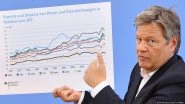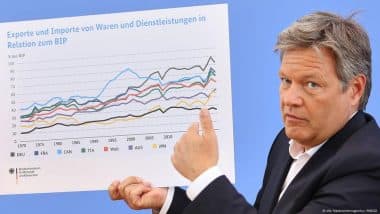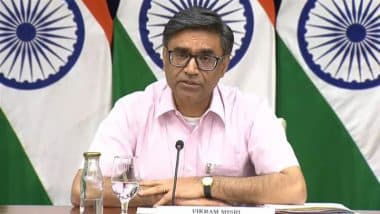Germany was the only G7 economy that failed to grow for the last two years, and is on track for a third year without growth in 2025.The German government cut its economic growth forecast to zero citing the impact of US President Donald Trump's trade policies .
Also Read | Germany Sees Zero Growth in 2025, Blames Trump Tariffs.
"There is above all one reason for this, namely Donald Trump's trade policy and the effects of the trade policy on Germany," outgoing Economy Minister Robert Habeck said.
He said there was little hope of relief for Europe’s largest economy following two years of recession in 2023 and 2024.
The German economy contracted by 0.3% in 2023 and by 0.2% in 2024.
How does Trump tariffs affect the German economy
The European Union (EU) was negotiating with Washington to avoid a further 20% proposed US tariffs on goods from the European Union.
The Unites States is Germany’s largest trading partner and Habeck said Trump’s tariff's are "hitting the German economy harder than other nations."
"The US trade policy of threatening and imposing tariffs has a direct impact on the German economy, which is very export-oriented," Habeck said.
The US tariffs, featuring a blanket 10% duty on all imports and 25% levies on cars, aluminum, and steel, are set to hit Germany's major export-based sectors like automotive and pharmaceutical industries hard.
It has also been dealing with ncreasingly fierce Chinese competition in key industries such as automobiles and machinery.
"Our big trade partners, China and the USA, and our neighbour, Russia, are causing us problems," Habeck said.
Bundesbank warns of possibility of 'Slight Recession'
However, Habeck and the government’s forecast is more optimistic than that of Germany’s central bank.
Speaking on the sidelines of the Spring Meetings of the World Bank Group and the International Monetary Fund in Washington, Bundesbank President Joachim Nagel said the best-case scenario is stagnation.
He could not rule out "a slight recession for 2025," adding that the period of uncertainty is not over.
Germany's economy has been mired in an economic crisis in recent years, with inflation soaring in response to the coronavirus pandemic and the Russian invasion of Ukraine.
Habeck voiced hope a new spending package worth many hundreds of billions of euros could help revive the economy under conservative Friedrich Merz, who is expected to take power in early May.
Edited by: Rana Taha
(The above story first appeared on LatestLY on Apr 24, 2025 09:20 PM IST. For more news and updates on politics, world, sports, entertainment and lifestyle, log on to our website latestly.com).












 Quickly
Quickly


















